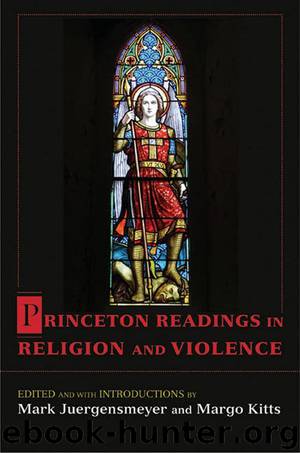Princeton Readings in Religion and Violence by Mark Juergensmeyer

Author:Mark Juergensmeyer [Juergensmeyer, Mark]
Language: eng
Format: epub
Publisher: Princeton University Press
Published: 2011-10-10T00:00:00+00:00
A process like the removal of the primal father by the band of brothers must have left ineradicable traces in the history of mankind and must have expressed itself the more frequently in numerous substitutive formations the less it itself was to be remembered. I am avoiding the temptation of pointing out these traces in mythology, where they are not hard to find, and am turning to another field in following a hint of S. Reinach in his suggestive treatment of the death of Orpheus.
There is a situation in the history of Greek art which is strikingly familiar even if profoundly divergent, to the scene of a totem feast discovered by Robertson Smith. It is the situation of the oldest Greek tragedy. A group of persons, all of the same name and dressed in the same way, surround a single figure upon whose words and actions they are dependent, to represent the chorus and the original single impersonator of the hero. Later developments created a second and a third actor in order to represent opponents in playing, and off-shoots of the hero, but the character of the hero as well as his relation to the chorus remains unchanged. The hero of the tragedy had to suffer, this is to-day still the essential content of a tragedy. He had taken upon himself the so-called “tragic guilt,” which is not always easy to explain; it is often not a guilt in the ordinary sense. Almost always it consisted of a rebellion against a divine or human authority and the chorus accompanied the hero with their sympathies, trying to restrain and warn him, and lamented his fate after he had met with what was considered fitting punishment for his daring attempt.
But why did the hero of the tragedy have to suffer, and what was the meaning of his “tragic” guilt? We will cut short the discussion by a prompt answer. He had to suffer because he was the primal father, the hero of that primordial tragedy the repetition of which here serves a certain tendency, and the tragic guilt is the guilt which he had to take upon himself in order to free the chorus of theirs. The scene upon the stage came into being through purposive distortion of the historical scene or, one is tempted to say, it was the result of refined hypocrisy. Actually, in the old situation, it was the members of the chorus themselves who had caused the suffering of the hero; here, on the other hand, they exhaust themselves in sympathy and regret, and the hero himself is to blame for his suffering. The crime foisted upon him, namely, presumption and rebellion against a great authority, is the same as that which in the past oppressed the colleagues of the chorus, namely, the band of brothers. Thus the tragic hero, though still against his will, is made the redeemer of the chorus.
Download
This site does not store any files on its server. We only index and link to content provided by other sites. Please contact the content providers to delete copyright contents if any and email us, we'll remove relevant links or contents immediately.
The Lost Art of Listening by Michael P. Nichols(7488)
Why I Am Not A Calvinist by Dr. Peter S. Ruckman(4148)
The Rosicrucians by Christopher McIntosh(3509)
Wicca: a guide for the solitary practitioner by Scott Cunningham(3166)
Signature in the Cell: DNA and the Evidence for Intelligent Design by Stephen C. Meyer(3125)
Real Sex by Lauren F. Winner(3013)
The Holy Spirit by Billy Graham(2943)
To Light a Sacred Flame by Silver RavenWolf(2813)
The End of Faith by Sam Harris(2733)
The Gnostic Gospels by Pagels Elaine(2527)
Waking Up by Sam Harris(2454)
Nine Parts of Desire by Geraldine Brooks(2357)
Jesus by Paul Johnson(2352)
Devil, The by Almond Philip C(2324)
The God delusion by Richard Dawkins(2305)
Heavens on Earth by Michael Shermer(2278)
Kundalini by Gopi Krishna(2180)
Chosen by God by R. C. Sproul(2160)
The Nature of Consciousness by Rupert Spira(2095)
